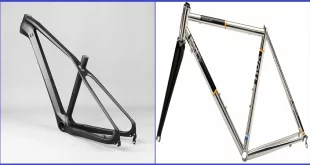Aluminum bike frames are typically lighter and more affordable than carbon frames, while carbon frames offer greater stiffness and comfort due to their vibration damping properties. Aluminum and carbon bike frames have distinct differences in terms of weight, cost, stiffness, and comfort.
Aluminum Bike frames are generally lighter and more budget-friendly compared to carbon frames. They offer good strength and durability, making them suitable for casual riders or those looking for a cost-effective option. On the other hand, carbon frames are notably stiffer and provide superior comfort due to their ability to dampen vibrations.
These frames are lighter, making them a popular choice for professional and competitive cyclists who prioritize speed and performance. Understanding the distinctions between aluminum and carbon bike frames can help cyclists make an informed decision based on their specific needs and preferences.
Understanding The Basics: Materials Used In Bike Frames
When it comes to choosing a new bike, one of the most important decisions you’ll have to make is the type of frame material you prefer. The frame not only affects the bike’s weight and durability but also plays a significant role in its performance.
Two of the most popular options available today are aluminum bike frame and carbon bike frames. Each has its own strengths and weaknesses, and understanding the differences between them will help you make an informed decision. Let’s dive into the world of bike frames and explore the key factors you should consider before selecting the right material for your next ride.
Different Types Of Materials Used In Bike Frames
Aluminum:
- Lightweight and relatively affordable compared to carbon frames.
- Offers excellent stiffness, ensuring efficient power transfer.
- Provides a comfortable ride due to its natural vibration-dampening properties.
- Suitable for riders who prioritize affordability and performance.
Carbon fiber:
- One of the lightest materials available, allowing for greater speed and agility.
- Offers superior strength and stiffness, enhancing overall performance.
- Provides exceptional shock absorption, resulting in a smoother and more comfortable ride.
- Ideal for riders seeking high-performance and a premium feel.
Importance Of Choosing The Right Frame Material
Selecting the correct frame material is crucial as it directly impacts your biking experience. Here’s why choosing the right frame material is important:
- Performance: The frame material affects the bike’s weight, stiffness, and shock absorption, all of which contribute to its overall performance. Selecting the appropriate material based on your riding style and goals will enhance your biking experience.
- Durability: Different frame materials have varying levels of durability. Considering your preferred riding terrain and frequency will help determine the material that can withstand the demands of your cycling activities.
- Budget: Frame materials have different price points, and your budget will play a role in deciding which option is best for you. Aluminum Bike frames are generally more affordable, while carbon fiber frames tend to be more expensive.
- Comfort: The right frame material can significantly impact the comfort of your ride. Some materials possess natural vibration-dampening properties, allowing for a smoother and more enjoyable cycling experience.
Ultimately, the choice between an aluminum bike frame and a carbon fiber frame depends on your personal preferences and priorities as a rider. Keep these factors in mind when making your decision, and you’ll be well on your way to finding the perfect bike frame for your needs.
Examining Aluminum Bike Frames
Aluminum bike frames are popular among cyclists for their lightweight and durable qualities. These frames are made from aluminum alloy, a material known for its strength and resistance to corrosion. In this section, we will examine the key factors that make aluminum bike frames a preferred choice for many riders.
Lightweight And Durable: Why Aluminum Is A Popular Choice
Aluminum bike frames are significantly lighter compared to other materials like steel or titanium. This lightweight nature offers several advantages for cyclists:
- Easy maneuverability: The reduced weight of an aluminum bike frame allows for agile handling, making it suitable for riders who prioritize speed and responsiveness.
- Effortless climbing: The lighter frame makes uphill climbs less tiring, as less energy is required to pedal uphill.
- Acceleration and speed: With less weight to propel, riders can accelerate quickly and maintain higher speeds, particularly in flat terrains.
Advantages Of Aluminum Bike Frames For Different Types Of Riders
- Recreational riders: Aluminum frames are an excellent choice for recreational riders who want a affordable and reliable bike. These frames offer decent performance and durability without breaking the bank.
- Commuters: Commuters value the robustness of aluminum frames to withstand daily wear and tear. These frames can handle rough pavement, potholes, and city streets with ease, making them a practical option for commuters.
- Entry-level cyclists: For beginners or riders on a limited budget, aluminum frames provide a cost-effective entry point into the world of cycling. These frames deliver commendable performance and can be upgraded with better components over time.
Potential Drawbacks Of Aluminum Bike Frames
- Harsh ride quality: Compared to carbon frames, aluminum frames can transmit more road vibrations to the rider. This can lead to a slightly rougher and less comfortable riding experience, especially on longer rides or rough terrain.
- Limited frame customization: Aluminum frames are often mass-produced, offering less flexibility in terms of customization. While they come in various sizes, riders with specific fit requirements may have limited options to achieve an ideal riding position.
Comparing The Cost Of Aluminum Bike Frames
- Aluminum frames are generally more affordable compared to carbon frames. This cost advantage makes aluminum frames an attractive option for riders who want a solid and reliable bike without breaking the bank. Riders on a budget or those who prioritize value for money often opt for aluminum frames.
Aluminum bike frames provide a combination of lightweight construction, durability, and affordability. They are favored by a wide range of riders, including recreational cyclists, commuters, and beginners. While they may have certain limitations, such as a slightly harsher ride quality and limited customization options, aluminum frames remain a popular choice among cyclists looking for performance and cost-effectiveness.
Comparing Carbon Bike Frames
Lightweight And Strong: The Appeal Of Carbon Frames
When it comes to choosing a bike frame, carbon frames are often praised for their lightweight and strong properties, making them a popular choice among cyclists of all levels. Here are some key points to consider when comparing carbon bike frames:
Benefits of carbon frames for various riding styles:
- Carbon frames are known for their exceptional strength-to-weight ratio, making them incredibly lightweight while still being able to handle the rigors of different riding styles.
- They offer a forgiving ride quality, dampening vibrations to provide a smoother and more comfortable experience on the road or trails.
- Carbon frames are highly versatile and can be designed to meet the specific needs of different riding disciplines, whether it’s road cycling, mountain biking, or even triathlons.
- The stiffness of carbon frames allows for efficient power transfer, enabling riders to accelerate quickly and maintain high speeds with ease.
Potential disadvantages of carbon frames:
- Carbon frames can be more susceptible to damage from impacts compared to aluminum bike frames, which may make them less suitable for riders who frequently encounter rough terrains or engage in aggressive riding styles.
- Repairing carbon frames can be more complex and expensive, requiring specialized knowledge and tools.
- Carbon frames may have limitations on their load-bearing capacities, so riders who regularly carry heavy loads or use their bikes for commuting purposes may need to consider this factor.
Cost considerations for carbon frames:
- Carbon frames tend to be more expensive compared to aluminum bike frames due to the higher manufacturing costs and the advanced materials used.
- However, it’s important to note that carbon frames offer excellent performance and durability, justifying the higher price tag for serious cyclists who prioritize top-notch quality and performance.
- Budget-conscious riders may opt for aluminum frames, which can offer good value for money without compromising too much on performance.
Carbon frames have numerous advantages that make them an attractive choice for cyclists seeking lightweight, strong, and versatile bike frames. However, it’s crucial to consider individual needs, riding styles, and budget constraints to make an informed decision.
Performance Comparison: Aluminum Vs Carbon Frames
Factors To Consider When Evaluating Performance:
- Weight: Carbon frames are lighter than aluminum frames, resulting in improved speed and maneuverability.
- Stiffness: Aluminum frames offer greater stiffness, leading to enhanced power transfer and responsiveness.
- Comfort: Carbon frames absorb vibrations better than aluminum frames, providing a smoother and more comfortable ride.
Ride Quality And Comfort: How Aluminum And Carbon Frames Differ:
- Aluminum frames can be stiffer, resulting in a firmer ride that may transmit more vibrations to the rider.
- Carbon frames have natural damping properties, offering better vibration absorption and a more comfortable ride.
Rigidity And Responsiveness: Which Material Excels In This Area?
- Aluminum frames excel in rigidity, ensuring excellent power transfer and responsiveness during accelerations and sprints.
- Carbon frames also provide good stiffness, but with the added benefit of compliance, offering a balance between rigidity and comfort.
Aerodynamics And Speed: The Impact Of Frame Material:
- Carbon frames are generally more aerodynamic than aluminum frames, reducing drag and improving speed.
- Aluminum frames may have thicker tube profiles, resulting in higher wind resistance and slightly lower speed potential when compared to carbon frames.
When it comes to choosing between aluminum and carbon frames, it all boils down to your personal preferences and riding style. Aluminum frames offer excellent stiffness and power transfer for those seeking a responsive ride, while carbon frames provide lightweight construction and superior comfort.
Consider your priorities and test ride different options to find the material that best suits your needs.
Which One Is Right For You?
Are you looking to upgrade your bike frame but aren’t sure whether to go with an aluminum frame or a carbon frame? Understanding the differences between these materials is crucial in making the right choice for your cycling needs. In this section, we will discuss how to assess your riding habits and goals, determine the most suitable frame material, and seek advice from experts and experienced riders to ensure you make an informed decision.
Assessing Your Riding Habits And Goals
When deciding between an aluminum frame and a carbon frame, it is important to assess your riding habits and goals. Consider the following points:
- Terrain: Are you mainly riding on smooth roads, tackling rough terrains, or hitting the trails? The type of terrain you ride on can influence the frame material that would be most suitable for you.
- Riding style: Do you prefer long endurance rides, competitive racing, or casual leisure biking? Your riding style can play a role in determining the right frame material that offers the desired performance and comfort.
- Weight: Are you concerned about the weight of your bike frame? Carbon frames are typically lighter than aluminum frames, making them a popular choice for riders who prioritize weight reduction.
Determining The Most Suitable Frame Material For Your Needs
Now that you’ve assessed your riding habits and goals, let’s explore the characteristics of aluminum and carbon frames to help determine the most suitable material for your needs:
Aluminum Bike frames:
- Strength: Aluminum frames are known for their strength and durability, making them ideal for riders seeking a robust and sturdy frame.
- Affordability: Compared to carbon frames, aluminum frames are generally more affordable, making them a budget-friendly option for those who don’t want to break the bank.
- Stiffness: Aluminum frames tend to be stiffer, providing excellent power transfer and responsiveness, which can be advantageous for riders focused on speed and acceleration.
Carbon frames:
- Lightweight: Carbon frames are incredibly lightweight, resulting in improved climbing abilities and overall bike maneuverability.
- Comfort: Carbon frames have the ability to absorb more road vibrations, offering a smoother and more comfortable ride, especially on longer distances.
- Customization: Carbon frames often have versatile design options and can be molded into various shapes, allowing for more customization in terms of ride characteristics.
Seeking Advice From Experts And Experienced Riders
When in doubt, it can be helpful to seek advice from experts and experienced riders who have firsthand knowledge of both aluminum and carbon frames. They can provide valuable insights and recommendations based on their own experiences and expertise. Consulting with knowledgeable individuals, such as bike shop professionals or cycling community members, can give you the confidence to make an informed decision that aligns with your specific needs and preferences.
By carefully assessing your riding habits and goals, understanding the characteristics of aluminum and carbon frames, and seeking advice from experts, you can make a well-informed choice when it comes to selecting the right frame material for your bike. Remember, the most suitable frame material ultimately depends on your individual preferences and the type of cycling experience you seek.
Frequently Asked Questions For What Is The Difference Between Aluminum Bike Frame And Carbon Bike Frames?
Can You Explain The Difference Between Aluminum Bike Frame And Carbon Bike Frames?
Aluminum frames are lightweight, affordable, and provide a smooth ride. Carbon frames, on the other hand, are even lighter, more expensive, and offer better shock absorption. While aluminum frames are durable, carbon frames are known for their exceptional strength and stiffness.
It ultimately comes down to personal preference and budget.
Why Do Some Cyclists Prefer Aluminum Bike Frames Over Carbon Bike Frames?
Cyclists who prioritize affordability and durability often choose aluminum bike frames. These frames are less prone to damage from crashes or impacts and are easier to repair. Aluminum frames also offer a stiff and responsive ride, making them a popular choice among sprinters and competitive riders.
What Are The Advantages Of Carbon Bike Frames?
Carbon frames are incredibly lightweight, resulting in faster acceleration and easier climbing. They absorb vibrations and road shocks, enhancing comfort on long rides. Carbon’s strength and stiffness allow for a more efficient transfer of power to the wheels, providing better control and handling.
These frames are also corrosion-resistant and have a longer lifespan compared to aluminum frames.
Conclusion
To summarize, the difference between aluminum bike frame and carbon bike frames lies in their composition and characteristics. Aluminum bike frames are known for their durability, affordability, and responsiveness on the road. They offer a stiff ride, making them an ideal choice for sprinters and racers.
On the other hand, carbon bike frames are lighter, offering a smoother and more comfortable ride. They possess excellent vibration damping properties, making them suitable for endurance and long-distance riding. Carbon frames are also known for their aerodynamic design and ability to absorb road vibrations, increasing overall comfort.
While aluminum bike frames are a reliable and cost-effective option, carbon frames provide a higher level of performance and comfort, yet are pricier. Ultimately, choosing between aluminum and carbon bike frames depends on your personal preferences, budget, and cycling goals. Take into consideration factors such as weight, riding style, and budget to make an informed decision that best suits your needs.
 CommutingLife Explore The World On Two Wheels
CommutingLife Explore The World On Two Wheels





